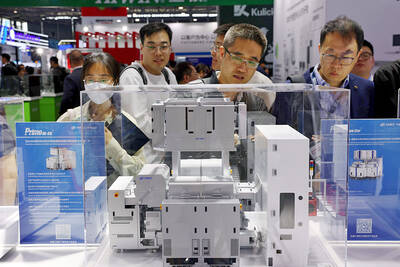Canadian Tire Corp is opening a Shanghai office this fall as it increases the number of made-in-China products it sells in Canada, the country's biggest hardware retailer said.
"There has been some growth in the China supply to Canadian Tire and this would certainly reflect that," Canadian Tire spokesman Scott Bonikowsky told reporters in an interview Friday.
Bonikowsky would not say what percentage of goods sold at Canadian Tire comes from China, nor how much that percentage has increased over the past few years or might increase once the store has staff in China.
"What I will say is that the overwhelming majority is domestically sourced, but we do have an important part of program that would be from China as well and all of the Pacific Rim for that matter," he said.
Canadian Tire has had an office in Hong Kong for 25 years, and will keep that operation even after opening the office in Shanghai, Bonikowsky said.
The company also has an office in Seoul and one in Taipei.
Michael McLarney, editor and publisher of the hardware industry newsletter Hardlines, said that by opening an office in Shanghai, Canadian Tire is following the lead of many other hardware retailers.
McLarney said while Canadian Tire's Chinese-made products will be less expensive to manufacture than products made at home, their quality won't likely suffer.
"What they're doing is they're going over and having products made to spec," McLarney said. "They'll get right into the Chinese factories."
Canadian Tire's Bonikowsky wouldn't say what products the 452-store retailer currently imports from China or which new ones might be available in the future. But McLarney guessed much of the store's Chinese products involve its private-label goods, such as its Mastercraft tools.
Canadian Tire also owns clothing retailer Mark's Work Warehouse, which could benefit from the inexpensive textile market in China.
For shoppers, Canadian Tire's foray into China should mean the company will stay competitive with other retailers with operations in that country, including US-based Wal-Mart, the world's biggest retailer, which reportedly bought US$12 billion worth of Chinese goods in 2002, and Home Depot.
The decision to open an office in China comes as Home Depot, the US big-box home-improvement retailer, examines opportunities to open stores in China.

With this year’s Semicon Taiwan trade show set to kick off on Wednesday, market attention has turned to the mass production of advanced packaging technologies and capacity expansion in Taiwan and the US. With traditional scaling reaching physical limits, heterogeneous integration and packaging technologies have emerged as key solutions. Surging demand for artificial intelligence (AI), high-performance computing (HPC) and high-bandwidth memory (HBM) chips has put technologies such as chip-on-wafer-on-substrate (CoWoS), integrated fan-out (InFO), system on integrated chips (SoIC), 3D IC and fan-out panel-level packaging (FOPLP) at the center of semiconductor innovation, making them a major focus at this year’s trade show, according

DEBUT: The trade show is to feature 17 national pavilions, a new high for the event, including from Canada, Costa Rica, Lithuania, Sweden and Vietnam for the first time The Semicon Taiwan trade show, which opens on Wednesday, is expected to see a new high in the number of exhibitors and visitors from around the world, said its organizer, SEMI, which has described the annual event as the “Olympics of the semiconductor industry.” SEMI, which represents companies in the electronics manufacturing and design supply chain, and touts the annual exhibition as the most influential semiconductor trade show in the world, said more than 1,200 enterprises from 56 countries are to showcase their innovations across more than 4,100 booths, and that the event could attract 100,000 visitors. This year’s event features 17

Germany is to establish its first-ever national pavilion at Semicon Taiwan, which starts tomorrow in Taipei, as the country looks to raise its profile and deepen semiconductor ties with Taiwan as global chip demand accelerates. Martin Mayer, a semiconductor investment expert at Germany Trade & Invest (GTAI), Germany’s international economic promotion agency, said before leaving for Taiwan that the nation is a crucial partner in developing Germany’s semiconductor ecosystem. Germany’s debut at the international semiconductor exhibition in Taipei aims to “show presence” and signal its commitment to semiconductors, while building trust with Taiwanese companies, government and industry associations, he said. “The best outcome

Semiconductor equipment billings in Taiwan are expected to double this year, as manufacturers in the industry are keen to expand production to meet strong global demand for artificial intelligence applications, according to SEMI, which represents companies in the electronics manufacturing and design supply chain. Speaking at a news conference before the opening of Semicon Taiwan trade show tomorrow, SEMI director of industry research and statistics Clark Tseng (曾瑞榆) said semiconductor equipment billings in Taiwan are expected to grow by an annual 100 percent this year, beating an earlier estimate of 70 percent growth. He said that Taiwan received a boost from a